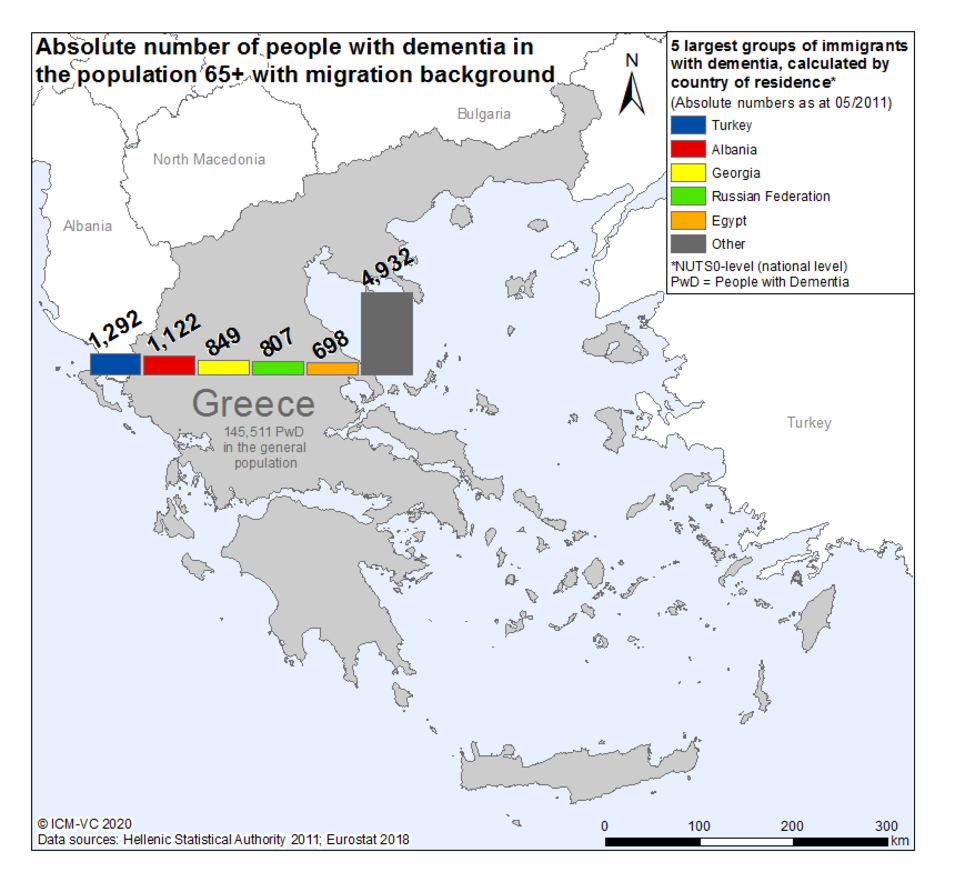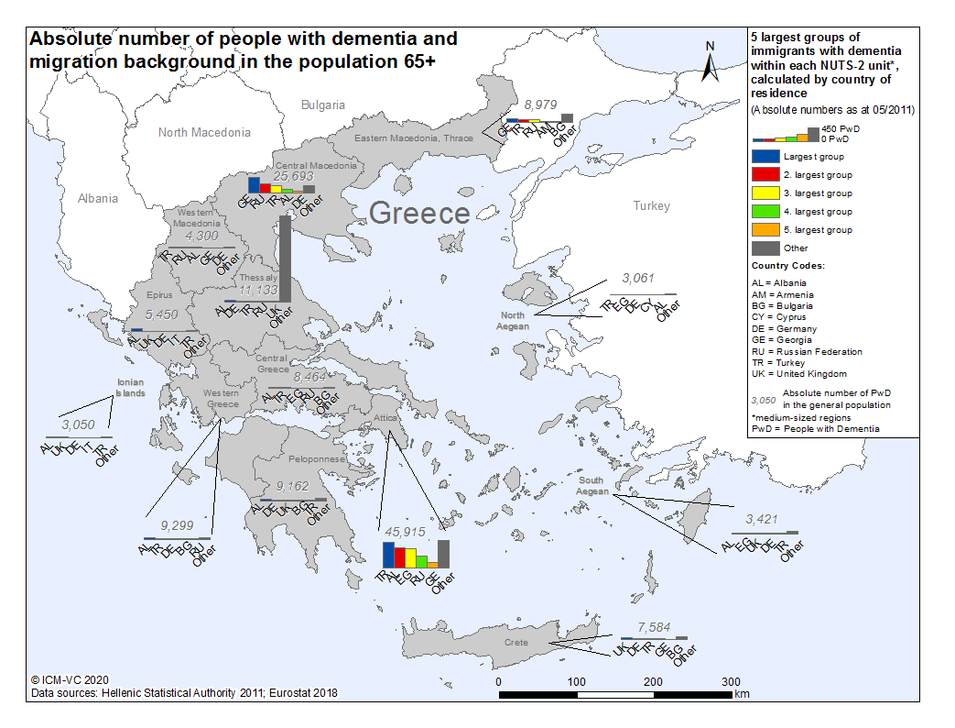EU-Atlas: Dementia & Migration
| Largest group | 2. largest group | 3. largest group | 4. largest group | 5. largest group | |
| Absolute numbers | |||||
| PwMD per 100,000 inhabitants 65+ |
| Absolute numbers | PwMD per 100,000 inhabitants 65+ | |
| Largest group | ||
| 2. largest group | ||
| 3. largest group | ||
| 4. largest group | ||
| 5. largest group |
| Prevalence per 100,000 inhabitants 65+*, calculated by country of residence | |||
|---|---|---|---|
| high > PwMD |
minor > - PwMD |
||
| increased > - PwMD |
low ≤ PwMD | ||
| medium > - PwMD |
|||
| PwMD = People with a Migration background with Dementia *Bulgarien, Litauen, Malta, Polen in der Bevölkerung 60+ |
|||
| Absolute number of PwMD 65+ | |
| PwMD per 100,000 inhabitants 65+ |
Greece
Until the end of the 20th Greece was characterised by emigration of large parts of the population, still waves of large-scale immigration occurred in the early 20th century, after the Second World War, and after the Central and Eastern European political systems collapsed in 1989. Between 1990 and 2005, Greece evolved from an emigration country to an immigration country. From 2007 onwards, the number of irregular migrants and asylum seekers entering Greece has also increased significantly. Since the Syrian conflict in 2011, Greece has become a transit country for migrants1,2. Between 2010 and 2019, the migrant population (born abroad) declined from 1.3 to 1.2 million and its proportion in the total population fell from 12.1 to 11.6%3.
There are 140,600 people with a migration background aged 65 or older. Of those, approx. 9,700 exhibit dementia. Calculations show the most affected migrant groups presumably originate from Turkey (approx. 1,300), Albania (approx. 1,100), Georgia (approx. 900), the Russian Federation (approx. 800), and Egypt (approx. 700)4.
The ‘National Action Plan for Dementia - Alzheimer's Disease’ from 2017 has a scope of 93 pages and contains four general chapters: ‘Dementia Worldwide’, ‘Dementia in Greece’, ‘Strategic Planning’, and ‘Axes and actions of the National Plan’. In none of these chapters a reference is made to the topic of migration5. According to an expert from the School of Psychology at the Aristotle University of Thessaloniki, Greece currently has no national treatment guidelines6.
According to an expert, there are no specialised services for migrants with dementia provided by the government either on a national or regional level. Generally speaking there is no specific provision for a culturally sensitive or a migrant-friendly healthcare in Greece. Measures to provide intercultural care or support are also not in development or planned. The private sector offers healthcare services, and if someone is able to pay for them, they will be taken care of no matter the ethnic background.
It seems that culturally sensitive care is not part of the professional qualifications, and there are no professional training possibilities in intercultural care available. There is a high proportion of (professional) caregivers in outpatient care. Regarding inpatient care, there seem to be suggestions about training people with a refugee background to work in inpatient care.
Family, religious communities, and migrant organisations play a crucial role in supporting family caregivers of migrants with dementia. The expert stated that existing healthcare services and information resources are not adequately helpful for family caregivers of people with a migration background since their unique needs are not addressed by them.
References
- Kasimis C, Kassimi C: Greece: A History of Migration. [https://www.migrationpolicy.org/article/greece-history-migration]. (2004). Accessed 21 Apr 2020.
- International Organization for Migration Greece: History. [https://greece.iom.int/en/iom-greece]. Accessed 21 Apr 2020.
- International Organisation for Migration: International migrant stock as a percentage of the toral population at mid-year 2019: Greece; 2019.
- Hellenic Statistical Authority: Population Census 2011; 2011.
- Sakka P, Politits A, Skarmeas N, Kyriopoulos G, Vidalis P, Takis D, Vorvolakos T, Koulouri F: National Action Plan for Dementia: Alzheimer's Disease. In. Edited by Ministry of Health Hellenic Republic; 2017.
- Aristotle University of Thessaloniki: National treatment guidelines for dementia Greece. In., E-Mail conversation edn; 2019.



![[Translate to Englisch:] Logo RBS [Translate to Englisch:] Logo RBS](/fileadmin/_processed_/9/7/csm_RBS_Logo_RGB_0e245a98a4.jpeg)